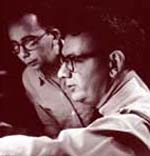Minnesota Romantic | Operas | Song Cycles | Choral Works | Orchestral | The Teacher/Composer | Timeline Part 6: The Teacher/Composer Producing at least one major work a year, and often more, Argento has been prolific despite the demands of a 40-year teaching career. He never sought the isolation of a freelance career. Wary of trendiness, he has been grateful for regular contact with the students who kept him informed about the popular musical culture. Although some of his students, such as Stephen Paulus, have gone on to become celebrated composers themselves, Argento does not take credit for it. "When a person comes in who has started to compose," he says, "you can shape them a bit. You can polish them up and knock off some of the rough edges. Education is not putting stuff into students: it's helping them get it out." Vern Sutton, who in the early 1960s was Argento's student, only to become his "boss" in the 1990s, when he became director of the University of Minnesota School of Music, says Argento graciously shouldered the requisite administrative responsibilities. "Most artists chafe in a bureaucracy," Sutton observes. "But Dominick willingly served on committees and even acted as division head. When given a job to do, he did it efficiently. Always the pencils were sharpened, the desk cleared at the end of the day—just like his workplace at home. When he was here, he was truly here, and was gladly available to his students."
Throughout his career, Argento has gone about his calling with a single-mindedness unconcerned with popularity. His goal has simply been to compose things musicians will want to perform. "If you write something they feel strongly enough about, and can put it across to the audience, you've got it made," he says. His theme of self-revelation is both artistic and personal. "Writing music is a way of learning who you are—a kind of self-discovery," he says. "If you put all my pieces together, that's me. That's who I am." Silver-haired at 75, Argento still conjures up the impression of dark good looks, and he speaks and writes music with an Italianate passion that belies his birthdays. Nowadays, he could go anywhere in the world, but he has no intention of leaving Minnesota. What keeps him here is the climate—the rising barometer of cultural health. 'In Minnesota," he says, "there is real love of the arts. They're not a social toy but are held in high esteem. Not only in the audiences, but among the donors, including the foundation and corporate levels, there's an honesty and dedication. People realize that what's happening is a good thing, and they support it. I'm here to stay."
|
||||||||||
MPR Home | News | Music Collection | Events | Radio Listening | Your Voice | About Us | Support Us | Help ©2005 Minnesota Public Radio | Terms of Use | Privacy Policy |
